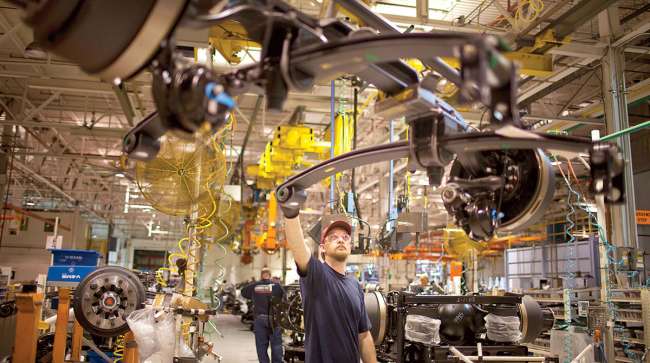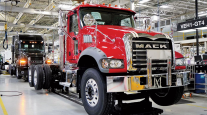Senior Reporter
Class 8 Orders Soar in October on Pent-Up Demand

[Stay on top of transportation news: Get TTNews in your inbox.]
North American Class 8 orders in October soared past the year-earlier volume and retreated a step or two from the previous month’s all-time record, ACT Research reported, calling it further confirmation of pent-up demand.
Preliminary orders were 42,500, according to ACT, which cited truck makers’ preliminary data set to be updated soon. That compared with net orders of 23,391 a year earlier.
September saw net orders rocket to a record 53,271. The previous record of 53,040 came in August 2018.
“The October number shows truck makers continue to feel comfortable with pricing and [parts and component] availability,” ACT Vice President Steve Tam said.

Tam
Until recently, buyers “have not been allowed to have a voice because of the conservative approach the truck makers have taken,” he said. But now that the truck makers are loosening up, fleets remain eager, “standing in line with their hands up, pens ready to sign contracts and wallets open, to get this equipment they have been denied for so long.”
FTR pegged preliminary orders at 43,200 units, with Class 8 orders now totaling 271,000 for the past 12 months.
“October was the turning point for the Class 8 market. While we face headwinds in the freight market, overall fleet sentiment remains optimistic,” Charles Roth, commercial vehicle analyst for FTR, said in a release. “Truck makers are now filling build slots well into Q2 and the early part of Q3 2023.
ACT Research: October Class 8 Orders Continue at Robust Levelshttps://t.co/ZbC4N0x2xP — ACT Research (@actresearch) November 3, 2022
“Component shortages continue to be a week-to-week issue; however, the overall sentiment from manufacturers is optimistic that improvements will be made in the coming months and throughout the first half of next year.”
But the retail channel through dealers, for some truck makers, means allocation plans are in place, Roth added.
He said it was likely orders gradually would decrease in the next two months.
Meanwhile, ACT forecast U.S. retail sales for 2022 to be 258,600 and expects that to fall to 233,000 in 2023 — an 11% decline.

Host Seth Clevenger and ZF’s Julien Plenchette consider how today’s advanced driver-assist systems technologies can support drivers and make them feel better behind the wheel. Tune in above or by going to RoadSigns.ttnews.com.
“I understand that forecasting lower sales next year given September and October’s high orders may seem incongruous,” Tam said. “The challenge, of course, is what’s happening in the broader economy.”
He said the Class 8 backlog was 222,000 units. “If October’s build plans play out as expected, we would add about 15,000 units to the backlog and end October with around 237,000 units — very much in line with our 233,000 sales forecast for 2023.”
At the same time, Tam said truck makers did not include EV orders in their Class 8 totals.
“We are on our third generation of electric adoption forecast reports. In Gen 1, we started having that conversation,” Tam said. “We have asked the truck makers to provide us a separate or ancillary data flow that would allow us to identify [those orders]. So far, although all of them want it, none of them are willing to provide it.”
In part, it could be that the volumes appear so low compared with Class 8 internal combustion engine trucks, even though the buzz around EVs remains in the forefront of plans for alternative powertrains.

Feight
Paccar Inc. CEO Preston Feight was asked how customers are approaching the idea of ordering and operating EVs.
“I think that they use the same kind of analytics they do to make any kind of a buying decision, as they’re looking for an operating cost advantage, a total cost of ownership equation to work for them,” he said.”It adds elements now with EVs because they think about charging and infrastructure and return and mileage and route and utilization. So, we partner with them at Peterbilt and Kenworth, DAF and [Paccar] parts, all partner with them to try to make sure they think about all the input costs that are going into it. And I think that that’s kind of a very active dialogue that depends upon their use case.”
Nikola Corp. on Nov. 2 announced Zeem Solutions — which bundles electric vehicles, charging solutions, maintenance and other services as a flat operating expense — executed a purchase order for 100 Nikola Class 8 Tre battery-electric vehicles to ensure immediate availability of electric trucks for freight and logistics companies using Zeem’s all-inclusive EV depot fleet solution.
Zeem Solutions takes advantage of Nikola’s immediate availability of zero-emission Class 8 trucks with a Purchase Order for 100 Nikola Tre BEVs. Learn more about today’s announcement here: https://t.co/5b6H9Hh7w5 @ZeemSolutions — Nikola Motor Company (@nikolamotor) November 2, 2022
Tre BEVs will help to satisfy Zeem’s current customer demand at its California depot and other future national locations, the company said.
Nikola has begun commercial production of its Class 8 vehicles and has immediate availability to supply customers such as Zeem, it noted.
During the third quarter, Nikola reported it produced 75 Nikola Tre BEVs and delivered 63 to dealers. It also began pilot testing with Saia Inc. and Walmart Inc., logging over 1,600 miles and 2,700 miles to date, it reported Nov. 3.
Saia Inc. ranks No. 21 on the Transport Topics Top 100 list of the largest for-hire carriers in North America.
Walmart Inc. ranks No. 2 on the TT Top 100 list of the largest private carriers in North America.
Want more news? Listen to today's daily briefing below or go here for more info:




